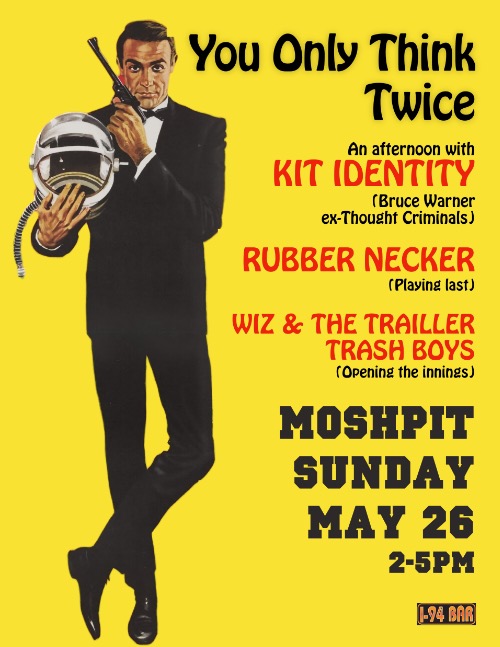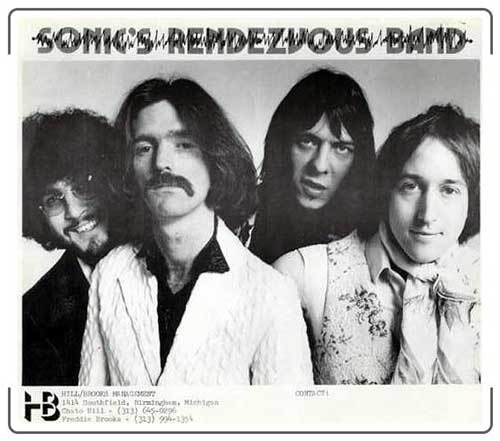 Much-traveled Michigan bassist Ron Cooke has passed away, his wife Pam announced on Facebook earlier today.
Much-traveled Michigan bassist Ron Cooke has passed away, his wife Pam announced on Facebook earlier today.
Although replaced by Gary Rasmussen before Sonic’s Rendezvous Band’s "classic" period (the one which produced "City Slang"), bassist W.R. "Ron" Cooke was there from the very earliest days, when Fred "Sonic" Smith was searching for a musical direction following the MC5's 1972 implosion.
Ron is pictured in an early publicity shot at right, and is second from the left.
Cooke was also a member of the Johnny Thunders-Wayne Kramer collision that was Gang War, an idea that the principals agreed looked good on paper but lost direction as old habits took hold.
And Ron had plenty of Detroit rock'n'roll history under his belt before then, most famously with Mitch Ryder's Detroit, whose killer version of Lou Reed's "Rock and Roll" was a classic slice of Motor City Rock Action that even the song's author agreed was "the way the song was MEANT to be played."
Ken Shimamoto talked to Ron from his home in Ann Arbor in early October 2000 as part of the research for this history of SRB. Here are Ron’s verbatim recollections.
 EARLY DAYS
EARLY DAYS
Detroit is a great music town, but it took a lot of people…if you really look on the whole Detroit music scene, it’s unbelievable how much music was produced in this community. I come from a real small rural town outside of Detroit, and we had three guys all plugging into one amplifier, that kind of stuff. I played my first professional gig here in Detroit when I was like 12 years old, at Cobo Hall, man. I was in some pretty hot bands as a kid, even. I was in a group called Bobby Dayton & the Daytonas. We were competing as the best band in Detroit against Billy Lee & the Rivieras (that became Mitch Ryder & the Detroit Wheels). So I go back a long time in the Detroit music thing, like back into the first part of the sixties, even as a young kid…my MOTHER was driving me to these gigs! So it goes back a long time for me.
As a kid, 13, 14 years old, I was playing at Cobo Hall with the Supremes and Choker Campbell’s orchestra and the Beau Brummels, and six weeks later, I was over at the Masonic Temple with the Dave Clark Five, and that kinda stuff. And even back before that, learning how to play the guitar and hanging out and meeting those guys in that little country town where I was at.
THE MC5
My relationship with the MC5 and Fred and those guys goes back a long time in Detroit, I mean from when we were like 15-years-old. When the MC5 weren’t even the MC5, when they were hanging out in Allen Park, Michigan. I kinda went in and out of that scene with those guys for our entire musical lives, our entire lives, really. I mean we grew up basically down on the lower southwest side of Detroit, in the suburbs, playing gigs and being in battles of the bands and all kinds of nuts things like back in ’63 and shit. It goes back a long time. In Detroit, to a certain extent, it wasn’t that it was cliquish, but there was a group of guys that kind of gravitated together.
Before the [Mitch Ryder’s] Detroit thing, the Catfish thing, we were just in bar bands, playing in nightclubs in Detroit…Toledo, Ohio. I remember when I started playing with the Detroit band, there was another hiatus when I wasn’t really actively in the music business very much, and I got a phone call, and they said, "Hey, would you like to come down and sit in?" So the next thing you know, man, I’m jumping in a limousine and blasting back out of town again, y’know what I mean? Back on the road. So that’s basically how I went in and out of it all the time.
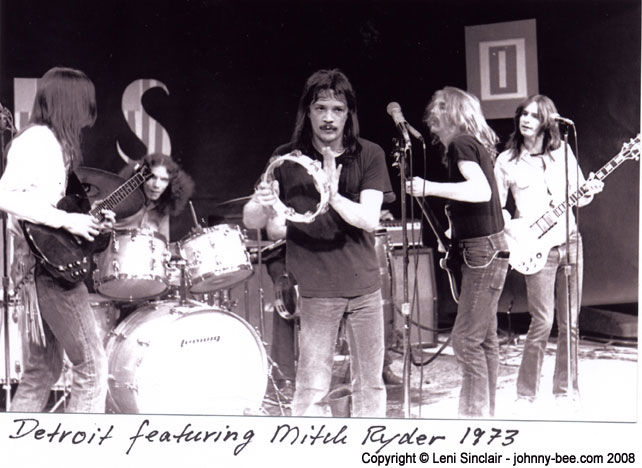 MITCH RYDER'S DETROIT
MITCH RYDER'S DETROIT
Here we are in the studio [with Detroit], we’re standing around and [producer] Bob Ezrin is there, and he goes, "What are we doing here?" Guys were just coming in and out. So, "Well, I’ve got this thing." ["Box of Old Roses"] was like a one-take thing. We threw that thing together, and actually on that session, the Detroit band had some rockabilly stuff we did where I played upright bass.
There’s like a whole ‘nother album and a half somewhere that never got released after that. I think the guys from the Guess Who bought a lot of the rights to all that stuff. I’d love to get my hands on that stuff, ‘cause that was the REAL Detroit band. Stuff that was on the record was stuff that was trying to be produced and commercial. The REAL Detroit band was the live band. That absolutely was a no-holds-barred rock’n’roll party. With MUSIC. It was a pretty good group, some good players in that band.
I tell ya, we were in town one time with the MC5…it was us - the Detroit band - the MC5 and Bob Seger. About 1971 or something, just before the Five dissolved. Christmas gig in Boston. Unreal, man. Unreal Detroit show. They had to call the police on the place to shut it down. It was going right out through the roof, man. It was a good gig.
We did a stint with [former Amboy Dukes singer] Rusty Day, me and [guitarist Steve] Dansby as the Cactus band. We did a thing through the Southwest with Rusty. Did that for about six or eight months. Traveled around, headlined at the Jacksonville sports arena: 15,000 people or some damn thing. How that happened was, [the original Cactus with Jim McCarty and two ex-Vanilla Fudgers] happened around the same time that the Detroit band was dissolving.
The Detroit band dissolved because of conflicts financially with record companies and indebtedness and just six and a half years of 280 nights a year, living in the back of a limousine and driving all over the country PLAYING. It dissolved just about the time we were getting ready to get over the hump. We had a record in the Top 40 with that Lou Reed thing ["Rock and Roll"]. But the dissolving of that was at the same time the Cactus thing was dissolving. We tried to keep the Detroit band going and we had Rusty Day singing in the band. Then we left and Rusty went on and did a Detroit thing with some guys here in Detroit for awhile.
Then next thing you know we get a phone call saying fly down to Florida somewhere, "Come down here, man, we’re rehearsing, we want you to go out on the road." I went down there and spent about two weeks, three weeks rehearsing, then we went out and did the Cactus thing and that’s where we got hooked up with the (Steve) Dansby guy, playing the guitar.
SONIC'S RENDEZVOUS BAND: THE BIRTH
I guess that whole Sonic’s Rendezvous thing basically came out of, I guess it must have been about ’73, ’74. I got a call from Dennis Thompson and he had this thing he was putting together. I jumped on my motorcycle and rode back down to Detroit, and I met with Dennis and I think Fred [Smith] was there. I think it was me, Fred and Dennis, and there was somebody else there. We kinda chewed this thing around a little bit, and I think we got together a couple of times and jammed, and then that thing kinda disposed and I got a call from Fred maybe like eight, nine months later, when Fred was living on the west side of Detroit. It wound up being me and Fred at the beginning, and this drummer…I forget his name now. We went around about doing some rehearsing in Fred’s basement in Detroit, jamming and got a few gigs on the east side of Detroit, did a few things.
At that point I had been out of the Detroit group for probably a year-and-a-half, and I just wound up doing some gigs with some bar bands and stuff, just jamming around and doing that kind of stuff, and then we got back into hanging out with Fred and doing those things.
Then me and Fred had a relationship going after that, we were kinda like buddies, we kinda had motorcycles and did a little riding and stuff down in Detroit, going to Greek Town and running around and hangin’ out with some buddies of mine that were into the motorcycle/hot rod thing in Detroit. Harry Phillips was with us, the piano player out of the Detroit group.
That whole thing went on for about three or four years, just kind of in and out of things, jamming a little bit and a couple of gigs. Then Scott got involved with it, Fred got Scott Morgan involved in it, and then it took off a whole lot more after that, and it was a lot more serious kind of thing about it. We started rehearsing a lot and doing a lot of gigs.
I got the first gig we ever did. I knew some hoodlums over on the east side of Detroit that had a bar, and we got in there and played a couple of nights in there. I think that we did some things at the old Miami, too. I think we did some Miami things, down on the Wayne State campus. For sure, we did a couple of things at the Second Chance in Ann Arbor, which was the premiere venue-type hall in Ann Arbor at the time. It think there was a couple of other gigs, I can’t really remember.
One time we were sitting at his dining room table with this drummer guy. This was before Scott Asheton got playing with it. This is the VERY BEGINNING, because Sonic’s Rendezvous Band was me and Fred at the beginning, and that was it. It was ME AND FRED! No drummer, no nothing; me going down to Fred’s house on the west side in the afternoon and jamming in the afternoon. Having tea, walking down the street, down to Michigan Avenue, going down to the bakery, coming back, smoking a bunch of cigarettes, drinking more tea, and jamming in the basement, and it progressed from there.
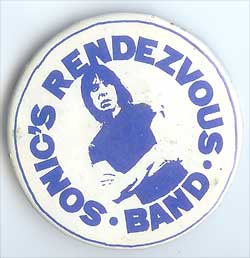 SONIC SMITH
SONIC SMITH
I’ll never forget Fred telling this drummer guy, and this is REALLY the true essence of what I feel the band was about. We were talking about…at one of these cigarette-smoking sessions where we were drinking tea…and talking stuff at his dining room table. Well, this guy said, "Well, I don’t want to play those kind of gigs ‘cause I don’t like these kind of people" or whatever. And Fred looks at the guy and he says, "Y’know, those people are no different than we are. We just get together over music and they get together over whatever THEY get over." And that was really kind of the philosophy, the soul of the band that Fred tried to put out.
But that’s basically in my recollection of the band when I was in it, it was more of a casual, "Let’s get together over some music and smoke a bunch of cigarettes and jam our brains out." The thing about "City Slang" and all those songs and all that stuff that came later…it was probably hard on Fred to even try and participate in all that stuff. ‘Cause he was really the "Rocket Reducer" kid, the "Kick Out the Jams" rhythm guitar player.
[When I started playing with Fred], we didn’t do any of the Five stuff, no covers. Really, the Fred thing and me was really a kind of a jazz-type rock improvisational jam thing. We laid out different parameters where we would go, and then we’d run in between and in and out of that. I do remember one song that Fred and me did compose together. It was called "The Grand River Subway." It was an instrumental jam and the premise of the jam – and it was a pretty funky thing – was to create a musical trip up Grand River Avenue out of Detroit, from downtown Detroit. Fred says, "Well, let’s just think about…we’re on a subway and we’re starting off in downtown Detroit, and we’re going to go all the way out through the suburbs with it." It was kind of a cool premise…it went from inner city funk, rock, blues, y’know, into the rock thing out in the suburban thing. It was a neat trip.
I’ve got two fabulous recordings that I’ve got here, I’m trying to locate the masters right now, it was a studio session that I produced with Fred and John Badanjek from the Detroit Wheels. It’s really some sweet stuff, man. I mean, it’s really some spaced-out stuff. I do know that the tape that I have, that one studio thing with Fred, John Sinclair, somebody told me that Sinclair had some of these things. We did one song, one song that Fred and Johnny B and me did together was "Space Age Blues," and then we’ve got this untitled instrumental thing that we did together that’s not a rock tune at all, it’s space city. I’ve got that on a little cassette that I’ve kind of held close to my heart for quite a few years. Fred plays some of the FINEST guitar chords on this thing that you’ve ever heard in your life. It’s a three-piece band but the way we recorded it, man, it’s so WIDE, the sound of it. It’s pretty spaced-out sounding thing.
I really enjoyed playing with Fred. He was a good guy, man. A really cool dude. Fred was not a real director -- he was but he wasn’t really strong at it. Fred was the most relaxed character on Earth. He was like the opposite end of the world from me, personality-wise, but we had a rapport together. When Scott [Asheton] came in, that’s when it appeared that Fred was trying to come out of his basement. He was like "Mr. Potato," you know what I mean? This guy was the most relaxed guy in the world. To try to get Fred to get out and go do a gig was like pulling teeth! Oh, yeah.
Where he got the name "Sonic" from, I don’t know. That was like the opposite end of the world. So when Scott got in the group…Fred Brooks got hooked up with Fred, and Brooks started to try to put some gigs together. We weren’t actively out trying to get gigs. For Fred to cut a deal with somebody to go out and say, "Hey, get us a gig" – that’s six to eight WEEKS of negotiations, and there’s nothing there to negotiate, y’know what I mean? That’s "Mr. Relaxed." So I guess Brooks started getting us some gigs, and that’s when Scott came in and we played a few gigs.
Chato? That’s a name I couldn’t even remember! I was just in the music and just cruisin’. I remember Chato. Little short guy.
Rasmussen? Gary’s a good player, he’s a good dude, I’ve known the guy a long time. He’s become a really good player over the years. I’ve seen him a couple of times, he’s played real good. But I dunno if the R&B thing…I guess I really did come from an R&B background.
There was actually a RECORD of Sonic’s Rendezvous Band produced? I guess there was. I wasn’t around when that happened. And I don’t really know much about the "City Slang" thing and the records or the CDs that were produced on that thing, ‘cause I wasn’t really around at that time. But at the beginning, I was there and I did do another of those first gigs there.
SIDE TRIPS
The Sonic’s Rendezvous thing, I guess kinda just we went in and out of that thing for a year and a half, two years. Then I guess other things caught my mind, I was doing other things in my life. I’m the kind of guy that if I was involved in something, sometimes it wasn’t always the best thing for me…I really got gung-ho on some of these things. As far as me goin’ in and out of the band…if you’re not enjoyin’ what you’re doin’, you don’t do it anymore.
I’ve got tons of tapes here from all that stuff. I’ve got a really great collection of live performances, basement rehearsals, studio jams, a lot of stuff that’s sitting here. I’ve probably got three to four hours of solid jamming going on between all these guys. The thing about the Sonic’s Rendezvous Band which kinda had another connotation to it was another group that we threw together, was the Brothers of the Road band kinda came out of it.
That band had myself in it, Harry Phillips playing piano, Johnny [Morgan] was playing drums, Scott, a guy here from Detroit, a really good guitar player by the name of Steve Dansby. Fred sat in a couple of times, but Fred wasn’t really involved in that very much. That was in the mid-seventies. It was just a group of guys that came together maybe four or five times a year and just played together, and we’d get to rehearse a little bit and do the things. That went on for about…really wasn’t like "we had to do it" kind of thing. Just something we enjoyed doing together, just setting equipment up and playing somewhere, rehearsing, sometimes we’d get in the studio and do some recording. I’m sure that there are tons of tapes around different spots. I think we even had guys like Mike Katon running around in and out of that thing once in awhile. Different configurations, not with Fred playing guitar in the band at the time.
The Scott Morgan thing, the relationship with him and the Brothers of the Road…I mean, there IS some great music, I’ve got it in the can up here. I’ve got a number of cans up here of that stuff. I hear things today on the radio that we were doin’ 15 years ago. If somebody would have grabbed that and packaged that and tried to hold that together and threw something at that, some lubricant that would’ve kept it going, it would’ve been pretty spectacular. There would’ve been some great music came out of it. ‘Cause there were a LOT of different influences on Sonic’s Rendezvous Band. It wasn’t just the MC5 or the Stooges music, it wasn’t the Detroit rock’n’roll thing. There was a lot of influences. I mean, we did some COUNTRY songs, for Christ’s sake! "Satisfying Love" is a wonderful song, and Morgan’s a hell of a songwriter.
The Brothers of the Road band was probably the most targeted thing that Scott has done in the last 15 years, I would think. Because he was drifting around like that, doing that kind of stuff anyway, but the Brothers of the Road band, I think it was something that Scott really wanted to see pull off, and so he did make a really concerted effort at trying to make it happen, and the songs and the tapes prove that. They prove that he was capable of putting a band together of guys and producing music with ‘em.
[Brothers of the Road] made some really killer music. You had the influence of Morgan, I was writing stuff, Harry Phillips was writing stuff. There was a lot of input there. Even some of that stuff got into the hands of John Mellencamp, man. Some of those original grooves. Some of the instrumental arrangements, absolutely I think got into the hands of John Mellencamp, even if they reworked it or changed some of the stuff.
It was some of his biggest stuff. I’m tellin’ ya, ‘cause I’ve been in bars and guys I know walked up and said, "Is that your band playing that stuff on the jukebox?" I’d say, "No, man, it’s not us." "Jesus Christ, I coulda swore it was you guys." Because guys that were in the Brothers of the Road wound up going down and hanging out, and a couple of guys wound up in the Mellencamp thing, and some of those tapes were in their pockets. Y’know what I mean? Some of that stuff gets pinched that way. That’s the way the music business goes sometimes. And we can blame it all on Beethoven, really. He started it. Back there. They’ve all been stealing from Beethoven for years anyway! Mozart. Everybody’s copying everybody.
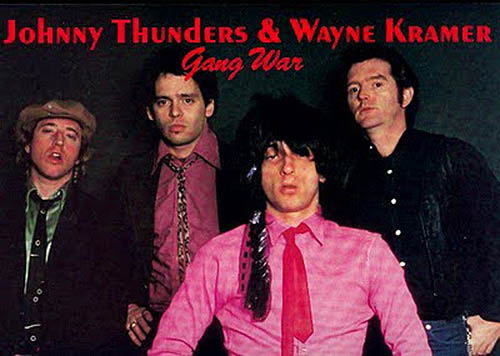 GANG WAR
GANG WAR
[By ’78, ‘79], I didn’t see Fred playing around that much, that was more the Brothers of the Road thing about that time. Then I wound up being in the Gang War thing with Johnny Thunders and Wayne, and that was really the last time I went out and did any gigging was 1981 at the latest. I was in the original thing with me, Wayne Kramer and Johnny Thunders, the Gang War thing, and a lot of crazy things that went down musically. [Gang War] was an endeavor to really try to produce some music and go out and do it. It was a short-lived thing, as far as my being in the group. I think we did that thing for like a year and a half. We called a bar up down in Ann Arbor, we said "We wanna play in your bar" and the guy goes, "Well, I’m not gonna pay you nothin’." I said, "You don’t have to pay us anything." It was a guy I knew who owned this bar and Christ, they were lined up on the street trying to get in to see us, y’know. We did some pretty good jams in that group. Once again, some of the better stuff was live than the recorded stuff. Some of the recordings are kinda contrived, as far as I’m concerned. Some of the live stuff really was a little bit better.
That was just something a guy up here in Detroit threw together. We brought Johnny out here and the best story about Johnny in Ann Arbor is we had him out in the country in a farm situation and he says, "You gotta take me down to Ann Arbor, Ron. Man, I gotta see some CEMENT." Johnny Thunders in Ann Arbor was wild. We got him hooked up in this beautiful old 1958 Buick thing he had, this car. Oh, man, he was wild. I’ve got pictures of him with my daughter sitting in his lap in my living room. The guy hung out with us. I helped raise his KIDS here for like a year and a half. Feedin’ his kids and takin’ care of ‘em. The last time I saw Johnny was here in Ann Arbor at a gig I think about a year and a half or two years before he died, really.
We had a lot of good gigs, we did the New York thing, Boston, Toronto, we had a great turnout for like three or four nights at a big cabaret in Toronto. Rockin’ right along. Some people like it, some people don’t, I guess. It was KNOCK DOWN ROCK’N’ROLL all the fuckin’ way. Just drinkin’, partyin’, goin’ one step in front of the fuckin’ law at all times. One step ahead of ‘em, boy. We ran the moves. It was cool!
My whole career playing music in Detroit was like, I went in and out of a lot of different things. I don’t know, either I stemmed some of those things on, or I was just apt to be a part of ‘em, but I seemed in my musical career to wind up doing a lot of eclectic, bizarre things with guys musically. My musical deal in my life is just…from the time I was 12 to 38 years of age it was ALL I DID. I lived and ate and drank music, that was it. Slept it, lived it.
SURVIVAL
It was just a great experience. I’m thankful that I made it through, ALIVE. A lot of us didn’t. Or were totally scarred for life, ‘cause you know what the rock’n’roll business is like. It really changed, the rock’n’roll business changed about 1980-something. It got to be where it was like a real business. Before that, the music industry…it seemed to me that management got a lot better for people. There was more money to be made, they took care of these guys a little bit better because they knew they had to protect their investment. I guess I really came up through the infancy of it in the rock’n’roll thing.
I guess just getting up in front of people and blowing music at ‘em was the best experience I ever had…good OR bad, and it wasn’t all good, believe me. I took my music seriously and I learned and studied under guys, and I took that very seriously. I feel honored that I was able to play with the guys that I was able to play with. It showed that I had the chops and I could do it. I wasn’t a one-note thumper, y’know what I mean? I could get around on that thing. The self-satisfaction of knowing that you were able to make music and some people liked it and it was a pretty good deal. I’ll tell you one thing up front, the guys that really played it and lived it, it was a spiritual thing in their life. It’s not a business! It’s something you did from your heart. That’s what music’s about.
I’m a family guy now, I’ve got a business I run and grandkids I’m raising. I do a lot of fishing and hanging out on this big boat I own. Now I play with my grandsons around the house. They like to beat on things! I’ll break out the guitar and we get to wailing on things! It’s not too bad! ‘Cause I spent so much time in the music business that by 1980 when I was hitting my prime, I was burnt out ‘cause I’d been doing it so long. When you start professionally at 14 years of age, it’s pretty tough to go on until you’re 50 years old. There’s guys that do it; I just lost interest, I guess. So I jumped on a Harley-Davidson and rode off into the sunset. That was me.


